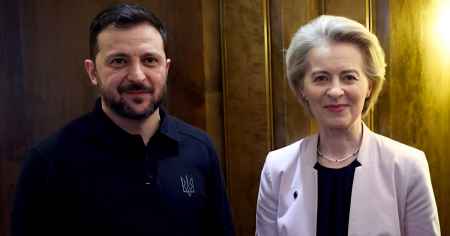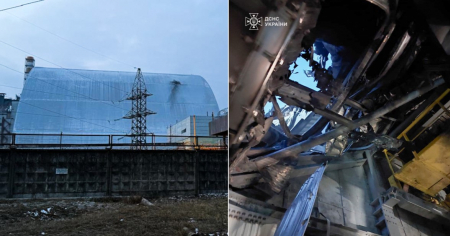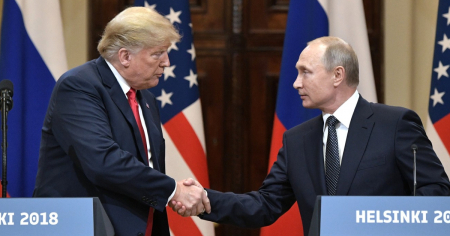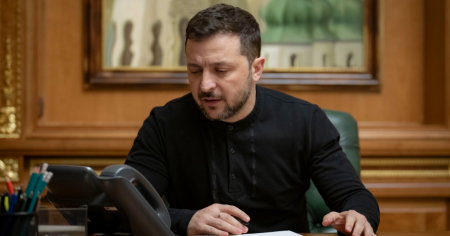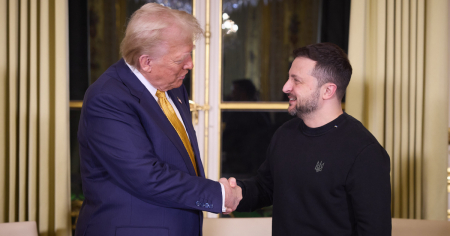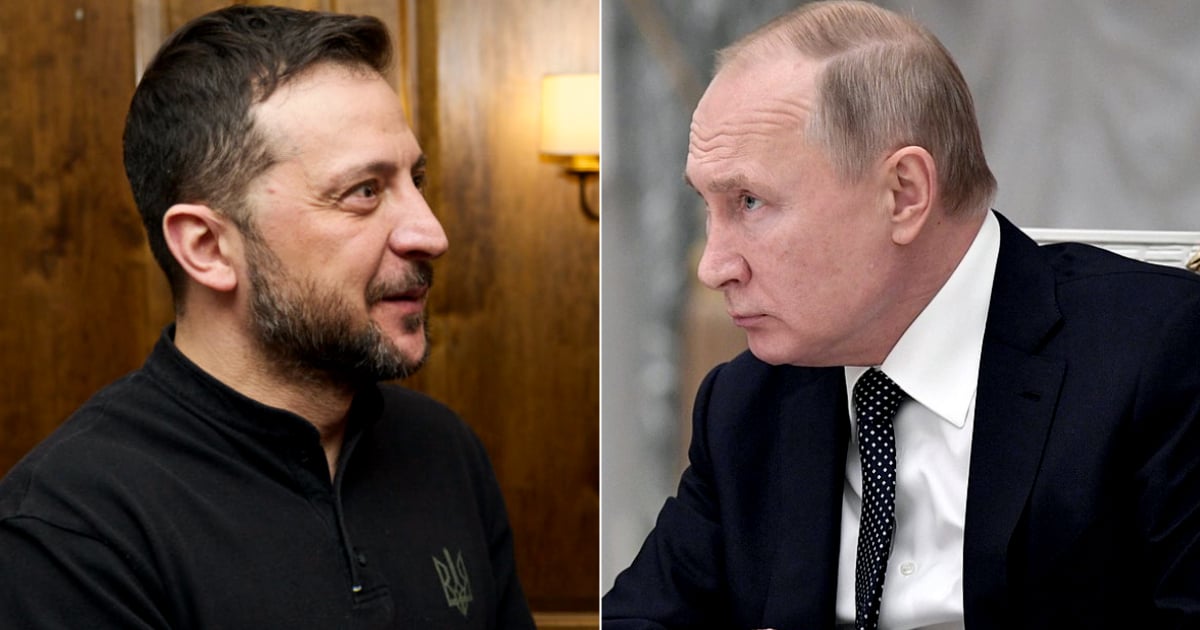
Related videos:
During his speech at the Munich Security Conference (MSC), the president of Ukraine, Volodimir Zelenski, warned that, despite the alliance's efforts, the influence of Vladimir Putin within NATO is concerning.
"I am not going to rule out the incorporation of Ukraine into NATO, but at this moment, the most influential member of NATO seems to be Putin," stated the Ukrainian president, highlighting ironically how the alliance's decisions appear to be influenced by the Kremlin's politics following the rise of President Donald Trump.
The historic alignment between the current occupant of the White House and the keeper of the keys to the Kremlin has raised alarm bells once again, following the discussions held between both leaders in search of an end to Putin's aggression in Ukraine.
Trump's despotic attitude and that of his administration towards the Ukrainian leader was reflected in statements and actions that have shaken the foundations of the Atlantic Alliance, leaving Europe and the Ukrainians in a secondary position that raises concerns about the mutual security commitment outlined in NATO's Article 5.
In his speech, Zelenski urged Europe to take a leadership role in its own defense and security, emphasizing the need for the continent to strengthen itself without relying solely on the United States.
"Europe must confidently decide its own future based on its strength, so that others have no choice but to respect its power," he emphasized.
The president also denounced the recent Russian drone attack on the sarcophagus covering the fourth reactor of the Chernobyl nuclear power plant, describing it as a "deeply symbolic gesture" from Moscow.
He also warned about the risk of increased Russian militarization in Belarus under the pretext of military exercises, which could pose a threat not only to Ukraine but also to European security as a whole.
"Belarus shares borders with three NATO countries and has become a Russian military stronghold," he warned, highlighting the increasing presence of forbidden weaponry in that territory.
Finally, Zelensky advocated for the creation of "European Armed Forces" to strengthen continental security and enable Europe to be an equal partner within NATO.
"Without a European army, that is impossible," he stated, emphasizing that the United States' leadership in the transatlantic alliance could change and that Europe must be prepared to take on its own defense.
The Ukrainian president concluded his speech by calling for immediate action to consolidate European unity, strengthen the continent's defense industry, and ensure that Europe's security is determined within its own borders rather than from external sources.
"The direction of European policy must not only be promising, but it must also make the United States eager to support a strong Europe," he concluded.
Geopolitical tensions and international negotiations
Zelenski's statements come at a critical moment in international politics, amid rising tensions between Russia, Ukraine, and Western powers.
Trump's conversations with Russian President Vladimir Putin have raised concerns in Europe about potential bilateral agreements that exclude Ukrainian and European interests.
Since the beginning of the large-scale war in 2022, the international community has supported Ukraine with sanctions against Russia, the provision of weapons, and financial assistance.
However, the uncertainty regarding the future of American commitment to Europe and NATO has led leaders like Zelenski to emphasize the need for greater autonomy in defense and security.
The militarization of Belarus and Russia's constant use of drones and missiles are intensifying concerns about an escalation of the conflict. Furthermore, Moscow's announcement of the creation of 15 new military divisions and the increasing use of foreign troops, including North Korean fighters, have raised alarms in European capitals.
In this context, Zelensky's proposal to strengthen European security through a joint army addresses the need to ensure stability on the continent without fully relying on support from Washington.
His call for unity and decision-making within Europe highlights the importance of acting swiftly before geopolitical dynamics change irreversibly.
Due to its importance, CiberCuba shares the full text of Zelensky's speech at the MSC:
At the Munich Security Conference, I emphasized that European policy should not only be promising but should make the United States eager to support a strong Europe. Europe must confidently decide its own future based on its strength, so that others have no choice but to respect its power.
The night before Munich, a Russian drone attacked the sarcophagus covering the ruined fourth reactor of the Chernobyl nuclear power plant. It was a Shahed drone, modified by Russia with Iranian technology, carrying at least 50 kg of explosives.
We consider this to be a profoundly symbolic gesture from Russia. Recently, in Ukraine, we discussed nuclear energy as a crucial factor for energy security, despite the constant attacks from Russia. We are preparing to expand the Khmelnytskyi nuclear power plant with the involvement of American companies, including Westinghouse. This will enhance not only Ukraine's energy security but also that of all of Europe.
We also spoke with President Trump and his team about the Zaporizhia nuclear power plant, the largest in Europe, currently occupied by Russia. And what was Russia's response? A drone attack on the Chernobyl sarcophagus, which contains radioactive dust and debris.
It's not madness; it's Russia's stance. A country that carries out this type of attack does not seek peace and is not preparing for dialogue. Almost every day, Russia sends up to 100 Shahed drones, along with ballistic missile attacks and an increasing number of aerial bombings. But that's not all.
This year, Moscow plans to create 15 new divisions, totaling 150,000 soldiers, more than the combined forces of most European countries. Russia is opening new military recruitment centers every week, and Putin can afford it: oil prices remain high enough for him to disregard the outside world.
We have clear information: this summer, Russia plans to send troops to Belarus under the pretext of "training exercises." This is precisely how they organized forces before the large-scale invasion of Ukraine. Is this Russian force intended to attack Ukraine? Perhaps. Or maybe... it is aimed at you.
Let's not forget: Belarus shares borders with three NATO countries and has become a Russian military stronghold. Putin and Lukashenko acknowledge that Belarus now hosts prohibited weapons: medium-range missiles and even nuclear arms. Putin views Belarus as another Russian province.
If someone is preparing a military launch platform, what should we do about it? And, more importantly, what can we do before the next attack? There have already been provocations at the borders of Poland and Lithuania, where organized migration crises by Russian intelligence services have been used to foster chaos. But what will happen if next time it is not about migrants? What if it involves Russian or North Korean troops?
Let’s not deceive ourselves: North Koreans are not weak. They are learning to fight in a modern war. And what about their armies? Are they prepared? If Russia launches a false flag operation or invades from Belarus (as it did in Crimea in 2014), how quickly will the allies respond? Will they respond?
Yesterday, here in Munich, the Vice President of the United States made it clear: the old relationship between Europe and the United States is coming to an end. From now on, things will be different, and Europe needs to adapt.
I believe in Europe. And you must too. I urge everyone to act, for your own good, for the good of Europe, for its people, their homes, their children, and our shared future. To achieve this, Europe must become self-sufficient, united by a common strength, Ukrainian and European.
At this moment, the Ukrainian army, supported by international aid, is holding back Russia. But if we don’t do it, who will stop it? Let’s be honest: we cannot rule out the possibility that the United States might say “no” to Europe on issues that directly threaten it.
Many leaders have spoken about the need for Europe to have its own army, a European Army. I believe the time has come. We need to create the Armed Forces of Europe. This is no harder than standing firm against Russian attacks, as we have already done. But it is not just about increasing defense spending in relation to GDP.
Money is necessary, but money alone will not stop an enemy attack. Weapons and trained soldiers are not free, but it's not just a matter of budgets. It’s about people realizing the need to defend their own home.
Without the Ukrainian army, the European armies alone will not be enough to stop Russia. Only our army in Europe has real and modern battlefield experience. But our army alone is also not sufficient. We need what you can provide: weapons, training, sanctions, funding, political pressure, and unity.
Three years of large-scale war have demonstrated that we already have the foundations for a united European military force. Now, while we wage this war and lay the groundwork for peace and security, we must build the Armed Forces of Europe. This way, Europe's future will depend solely on Europeans, and decisions regarding Europe will be made in Europe.
That is why we are in discussions with European leaders and the United States about military contingents that can ensure peace, not only in Ukraine but throughout Europe. That is why we are developing joint production of weapons, especially drones.
The Danish model of joint investments for weapon production in Ukraine is already in operation, and it is doing well. Just last year, thanks to the efforts of Ukraine and its partners, we manufactured over 1.5 million drones of various types. Ukraine is now the global leader in drone warfare. This is our success, but it is also your success.
Everything we build for our own defense also strengthens our security. The same should apply to artillery, air defense, and armored vehicles. Everything necessary to protect lives in modern warfare must be produced in Europe, in its entirety.
Europe has everything it needs. It just needs to come together and act, so that no one can say "no" to it, give it orders, or treat it like an easy target. It's not just about amassing weapons, but about creating jobs, technological leadership, and economic strength for Europe.
Last autumn, in my Victory Plan, I proposed replacing part of the U.S. military presence in Europe with Ukrainian forces (if Ukraine is in NATO). If the United States reduces its presence, it is dangerous, but Europe must be prepared. I raised this even before the U.S. elections, seeing the direction U.S. policy was heading. However, the United States must also pay attention to the direction Europe is taking.
This orientation of European policy must not only be promising but should also make the United States eager to support a strong Europe. Europe must decide its own future. We need to have confidence in our own strength so that others will have no choice but to respect the power of Europe. Without a European army, this is impossible.
It is not about replacing NATO, but rather ensuring that Europe's contribution to our partnership is equal to that of the United States. We need the same approach in diplomacy: working together for peace. Ukraine will never accept agreements made behind our backs without our involvement. The same rule should apply to all of Europe.
Decisions about Ukraine cannot be made without Ukraine. Decisions about Europe cannot be made without Europe. Europe must have a seat at the table when decisions about its future are made; anything less is unacceptable. If we are excluded from negotiations regarding our own future, we all lose.
Look at what Putin is trying to do. This is his game. He wants face-to-face talks with the United States, like before the war, when they met in Switzerland and it seemed they were about to divide the world. After that, he will try to get the U.S. President to appear in Red Square on May 9, not as a respected leader, but as a supporting figure in his performance.
We don't need that. We need real success. Real peace. Some in Europe may not fully understand what is happening in Washington right now. But let us focus on understanding ourselves, right here in Europe. First, we must empower Europe.
Does the United States need Europe? As a market, yes. But as an ally? For the answer to be "yes," Europe must have a single voice, not a dozen different voices. Even those who regularly visit Mar-a-Lago must be part of a strong Europe, because President Trump does not like weak friends. He respects strength.
Some in Europe may feel frustrated with Brussels, but let's be clear: if it’s not Brussels, it will be Moscow. That is geopolitics, it is history. Moscow will tear Europe apart if we, as Europeans, do not trust each other.
A few days ago, President Trump told me about his conversation with Putin. Not once did he mention that the United States needs Europe at that table. That says a lot. The old days are gone when the United States supported Europe just because it always had.
President Trump once said, “What matters is not the family you were born into, but the one you create.” We must build the closest possible relationship with the United States, a new relationship, but as Europeans, not just as separate nations. That’s why we need a unified foreign policy, coordinated diplomacy, the foreign policy of a common Europe. The end of this war must be our first shared success in this new reality.
We are already working to ensure that on February 24, the third anniversary of the large-scale Russian invasion, we can gather in Kyiv and online. All European leaders. All key partners defending our security. From Spain to Finland. From Britain to Poland. From Washington to Tokyo.
This meeting should provide a clear vision of the next steps we will take regarding peace, security guarantees, and the future of our collective policy. I do not believe in security guarantees without the United States: they will be weak, but the United States will not offer guarantees unless Europe's own guarantees are strong.
I also will not rule out the possibility of Ukraine joining NATO, but at this moment, the most influential member of NATO appears to be Putin, because his whims have the power to block NATO's decisions, despite the fact that it was the Ukrainian army that stopped Russia, not a NATO country or NATO troops, but just our people and our army.
In this war, there are no foreign armies fighting on the side of Ukraine, but Putin has lost nearly 250,000 soldiers, and over 610,000 have been injured. In the battle of Kursk alone, our troops eliminated almost 20,000 Russian soldiers. We completely destroyed the North Korean units that Putin had to bring in because his own forces were insufficient to contain our counteroffensive.
For more than six months, Ukrainians have maintained a strong position on Russian territory, despite Russia's desire to create a "buffer zone" within our territory. I am proud of Ukraine and our people, but I ask each of you to answer honestly: if Russia were to come for you, could your army fight in the same way?
I don’t want anyone to ever find out. That’s why we’re talking about security guarantees. That’s why we believe that the core of any security guarantee for Ukraine must be NATO membership. Or, if that’s not the case, then the conditions that allow us to build a different NATO, right here in Ukraine.
At some point, there will be a border between war and peace. Where that border is drawn and how firm it is, depends on us. The eastern border of Ukraine, the eastern border of Belarus, the eastern borders of the Baltic States, the eastern border of Finland. That is the most solid security line for all of us in Europe because it is the line of international law.
Do we still remember what international law is? Let’s be honest, the phrase "international law" already sounds a bit outdated. But I believe Europe's mission is to ensure that international law remains significant.
What security guarantees can Putin offer? Before the war, many doubted that Ukraine's institutions could withstand Russian pressure. But in the end, it was Putin who faced an armed rebellion from within. He was the one who had to defend his own capital from his own warlords. That alone demonstrates his weakness.
What will happen to the million Russian soldiers currently fighting in Ukraine? Where will they go to fight if not in Ukraine? We cannot accept a ceasefire without real security guarantees, without putting pressure on Russia, without a system to keep Russia in check.
To fight against us, Putin has withdrawn troops from Syria, Africa, the Caucasus, and even from some part of Moldova. Right now, he is facing a shortage of combat forces. If this war ends badly, he will have a surplus of battle-hardened soldiers who know nothing but how to kill and loot.
This is yet another reason why this war cannot be decided by a few leaders, neither by Trump and Putin, nor by me and Putin, nor by anyone sitting here in Munich talking privately with Putin. We must apply pressure together to achieve true peace.
Putin cannot provide real security guarantees. Not only because he is a liar, but because Russia, in its current state, needs war to maintain power. And the world must be protected from that.
What is needed? An armed forces structure for Europe as an enhancement of NATO. A common European foreign policy. A level of European cooperation that Washington must take seriously. International law. Maintaining all pressure on Russia, because that pressure is what guarantees peace, not Putin's words, not just some papers.
Putin lies. He is predictable and weak. We must take advantage of that, now, not later. We must act as Europe, not as separate individuals. Some say the new year does not begin on January 1st, but with the Munich Security Conference. This new year begins now: let it be the year of Europe. United, strong, secure, and at peace. Peace for Ukraine, Europe, and the whole world.
Filed under:

